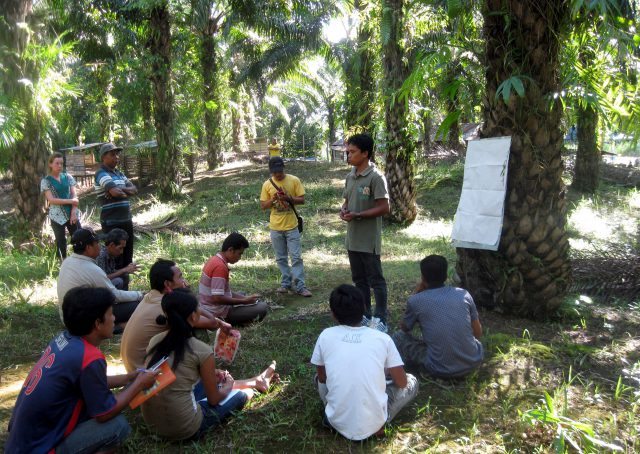Henkel and BASF are collaborating with the development organization Solidaridad to support a project in Indonesia and advocate for smallholders and local initiatives concerning palm oil.
Through the project, Solidaridad and its partners want to establish sustainable supply chains for palm and palm kernel oil that both effectively improve smallholders’ living conditions and are eligible for certification according to the criteria of the Roundtable on Sustainable Palm Oil (RSPO).
Of the 5,500 farmers that will be reached by the project, 1,600 will learn about the different aspects of good agricultural practice (GAP) in direct trainings that include measures for sustainable farming as well as for increasing crop yields.
Furthermore, around 3,900 smallholders will be reached not only through a multiplier effect, but also via farmer field days and regular text messages on their mobile phones.
The project spans an area of roughly 16,000 hectares.
Sustainable farming methods, efficient production and high occupational health and safety standards are some of the most important conditions for certified palm oil production.
Smallholders can learn how to fulfill these requirements locally in dedicated training programs.
Since 2015, Henkel has been supporting the five-year-project in the Indonesian province of West Kalimantan.
Earlier this year, BASF joined the effort as an additional industrial partner.
The smallholder program is implemented by Solidaridad in cooperation with its partners Good Return and Credit Union Keling Kumang (CUKK).
The Australian non-governmental organization Good Return coaches and supports the teachers who carry out the trainings on the ground and who will continue the farmer support program after the project ends.
The teachers are employees of CUKK, the second largest local credit organization in Indonesia.
Higher yields for smallholders
The productivity of small farms in the palm oil industry is estimated to be 40% lower than the average when compared with larger companies.
Measures ranging from farmer trainings to sustainable farming methods are expected to increase palm fruit yields and increase smallholders’ revenue.
“We think that it is of great interest that companies using palm oil products take responsibility beyond just buying sustainable palm oil, and contribute to investing in more sustainable and inclusive palm oil supply chains on the ground,” said Marieke Leegwater, program manager palm oil at Solidaridad.
“This project certainly contributes to building such inclusive and sustainable chains, as it is expected to make a significant contribution to improve the livelihoods of independent oil palm farmers in the province of West Kalimantan, one of the poorest regions in Indonesia.”










